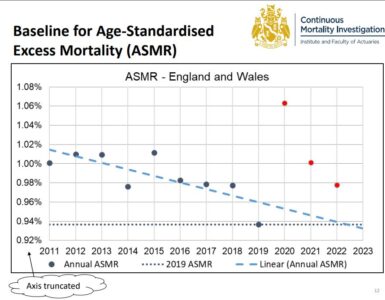We all now take for granted that vaccination against COVID-19 significantly reduces your risk of death from the virus. We’ll leave aside for now some burning questions about exactly how large that reduction is for different variants, and how vaccines affect transmissibility.
The clear differential between COVID-mortality risk for vaccinated and unvaccinated people poses an interesting question for life insurers (and for reinsurers who insure the insurers): should COVID-vaccination now be an underwriting question for life insurance applications, just like we are asked about smoking status, or recent medical history?
Earlier in 2021, the question was in many actuaries’ minds, but was generally left in the ‘for later discussion’ category. For instance, this article in FT Adviser from March had the following comments from leading Protection writers:
- Zurich (Peter Hamilton, market engagement) – “too early to say if it could become a more formal part of the underwriting process in future” but indicated it was unlikely;
- Scottish Widows was not planning to request results of vaccines on applications, adding that it did not ask about other vaccines during underwriting, but was closely monitoring the situation;
- Aviva (Robert Morrison, chief underwriter) was not then introducing vaccine-related questions, but it would continue to review its underwriting criteria.
Overall, the article concluded that insurers were split on the issue, with some protection providers accepting change could happen, while others said they had no plans to ask customers about vaccination.
However, Discovery Life in South Africa appears to be the first mover. It has recently announced that the vaccination status of new clients will now be considered when determining their benefits and premiums. Discovery will use the reward mechanisms built into their offering to provide discounts to policyholders who have been vaccinated, and they may increase the premiums of new policyholders who indicate that they are unwilling to be vaccinated (in a similar way to which smokers are treated).

Discovery states that the decision was informed by clear evidence of the efficacy of vaccines, as well as the acceleration of the vaccine campaign in South Africa.
It’s not clear how this policy will apply to age groups that have not had the opportunity to be vaccinated yet, though that will soon be a moot point as vaccinations will open for the 18-34 age group at the start of September, effectively opening access to all aged 18 and over.
Added context may well be South Africa’s high mortality burden:
- Medical Research Council and University of Cape Town researchers estimate that there have been an estimated 223,000 excess natural deaths associated with the pandemic, the majority of which are believed to be directly due to COVID-19. That is about 0.4% of the South African population.
- The Continuous Statistical Investigation committee of the Actuarial Society of South Africa monitors excess deaths in insurance portfolios and have seen a fourfold increase in death claims during the second wave from fully underwritten life insurance products in South Africa.
- Association for Savings and Investment South Africa (Asisa, the life insurance industry body in South Africa) also note an estimated additional R31.7bn (around £180m) benefits paid out in 2020 compared with 2019.
The move clearly makes sense from a risk-based-pricing perspective, but there are various issues that insurers would need to consider before moving the same way (and these will generally vary by territory):
- The quantity of the ‘surcharge’ for the unvaccinated will obviously need careful consideration. Monitoring should focus not only on recent insured experience but on emerging evidence of vaccine efficacy against new variants.
- If there is a recognised ‘waning’ effect, will boosters be a requirement, or is the original vaccination decision a reasonable behavioural flag that such policyholders are likely to want to take boosters when available?
- How can insurers avoid any accusation of discriminatory pricing in countries where vaccine hesitancy is associated with protected characteristics such as ethnicity? This is clearly a complex topic but insurers are already handling similar issues with other medical conditions.
- Particular care will be needed where access to vaccines is not yet universal.
- Can the pricing change be presented favourably, for instance as a discount for vaccinated customers rather than a higher premium for the unvaccinated?
- In a territory where most are vaccinated (such as the UK) this underwriting change may make little difference, but where many are yet to be vaccinated, the move may provide a further incentive to have the vaccine.
Differentiated pricing is likely to be seen as coercive by those who disagree with vaccines, in particular those disagreeing with compulsory vaccination, as it may be seen as a form of ‘indirect coercion’.
On the other hand, the issue can be reframed in this way: such differentiation enables those who do not wish to be vaccinated to still get cover, at a price which reflects the increased risk, rather than excluding them (or forcing vaccinated people to cross-subsidise them by paying more). Insurers will also be able to manage their risk better without needing to exclude anyone from insurance cover.
An underwriting change that both maximises access to insurance and maximises fairness to policyholders is likely to seem like a good move to actuaries and underwriters, but the overall balance of issues may be less clear in some countries.














